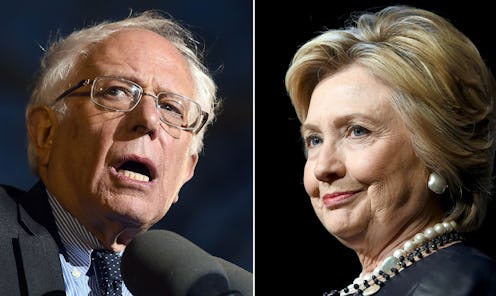News
Wyoming Didn't Dwindle The Delegate Count Much
On Saturday, Democratic voters in Wyoming participated in the state's caucus, becoming the latest state to award the ever-important delegates that candidates need in order to secure their party's nomination. As one of the least populated states in the country, Wyoming only had 14 Democratic delegates to distribute — and in true Equality State fashion, both Bernie Sanders and Hillary Clinton ended up with seven. That's nowhere near enough for either candidate to lock in the nomination, as several contests and hundreds of delegates remain after Wyoming for candidates on both sides of the aisle.
When it comes to delegate math, there's always a short and a long story. The short version is this: After Saturday's caucus in Wyoming, the Democrats have just shy of 2,000 delegates left on the table. Clinton and Sanders are trying to reach 2,383, the number of delegates needed to secure a Democratic nomination. After Wyoming, Clinton sits in the lead with 1,305 delegates, and Sanders has 1,086. (These totals don't include superdelegates — that's a whole different story altogether.)
Republicans didn't compete in Wyoming on Saturday, as their caucus took place back in March. But, like the Democrats, Republicans still have a long way to go until a nominee is decided. There are 769 pledged delegates left in play, and Donald Trump is the closest to the party's 1,237-delegate threshold, currently counting 742 delegates in his folds.
The long story looks a little more complicated, thanks to what lies ahead. On the Democratic side, Clinton has maintained a strong lead throughout the primaries, but there's some concern that her momentum may be slowing. Including Wyoming, Sanders has won seven states in a row, picking up more than 200 delegates. Clinton has earned delegates in that time, too, but she hasn't dominated in the way that she did earlier in the season. It's a pretty bad time for her to be losing momentum, as important states like New York and Pennsylvania loom ahead in the next few weeks.
Despite the changes in momentum, at least Sanders and Clinton can rest assured that one of them will secure the nomination before the convention in July. On the Republican side, that fact is still up in the air. With 742 and 516 delegates respectively, Trump and Texas Sen. Ted Cruz are both within reach of the 1,237-delegate threshold that they need to reach. Ohio Gov. John Kasich, who has just 143 delegates, is not. Even still, Trump and Cruz both need to win big throughout the rest of the contests in order to reach the golden number. Cruz, in particular, needs a whopping 721 of the remaining 742 delegates.
Although it's been months since the primary process started, there's still an important road ahead for the presidential hopefuls. In fact, some of the biggest contests haven't even happened yet. Next, both parties will head to New York, where 95 Republican delegates and 291 Democratic delegates will be up for grabs.
